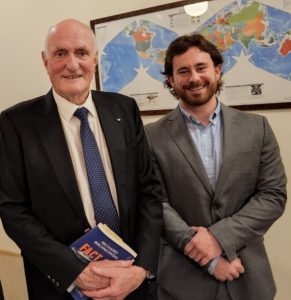Fact or Fission: the 2022 edition of Richard Broinowski’s analysis of Australia’s nuclear ambitions
On Tuesday 28th June, the NSW Branch of the Australian Institute of International Affairs hosted Mr Richard Broinowski AO as we launched the updated version of his 2003 book, Fact or Fission: the truth about Australia’s nuclear ambitions. In the course of his speech, Broinowski highlighted the historical approaches of Australian policymakers to the use of uranium and fissile materials and the subsequent policies adopted by the Australian Government. Broinowski also explained the need for the re-publishing of his 2003 book, highlighting that the recent AUKUS agreement and subsequent debate on the use of nuclear in Australia required comment and analysis.
In detailing Australia’s history with nuclear technologies, Broinowski referred to the nuclear testing conducted on Australian soil and in the Pacific, Prime Minister Gorton’s fleeting ambition for a nuclear reactor in Jervis Bay, and the staunch regulation of uranium mining and exports developed under Whitlam, Fraser, and Hawke. Broinowski, in his historical recount, contextualised the current AUKUS deal and proceeded to highlight the flaws of the deal. This included Australia’s lack of the desire and the technical capability to maintain and operate nuclear submarines, the large expenses involved, and the potential entanglement of the Australian military in aggressive, US-led operations in the Pacific.
A lively question-and-answer session then ensued, in which Broinowski fielded a range of questions from the role of nuclear submarines and nuclear weapons as deterrents to the potential for domestic issues in the United States to create instability within its relationship with Australia. Broinowski emphasised that obtaining nuclear-powered submarines could prompt proliferation of nuclear weapons in the immediate region and could be perceived as an act of aggression that could enhance regional instability. Australia needs to invest in its defence, not its attack capabilities, and it is unwise to continue to adopt a war posture with China, Australia’s largest trading partner. Asked about domestic issues of the US, Broinowski could not foresee the US relationship with Australia being impacted.
Broinowski also noted the lack of Australian technical expertise to operate nuclear submarines. If policy-makers pursued this option, the politically poisonous decision as to where the submarines should be based had to be made. Nuclear waste disposal would always be politically contentious. Furthermore, unless Australia was to breach societal norms and various regulations, fuel rods for the submarines would have to be sourced from overseas, most likely the US, in what is an expensive and complicated procedure. This dependence on the US could lead to effective US control of the fleet, an undesirable outcome undermining Australian sovereignty and leading us to pursue American interests in the Pacific.
Report by Drew Beacom, AIIA NSW intern
